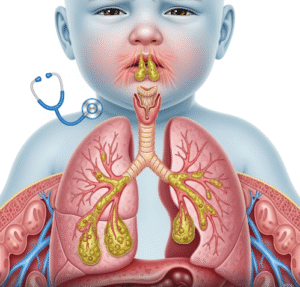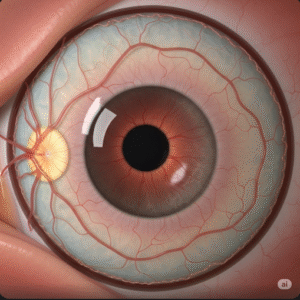Overview
Obsessive-Compulsive Personality Disorder (OCPD) is a chronic personality disorder marked by rigid perfectionism, orderliness, control, and a preoccupation with rules and organization—often at the expense of flexibility and interpersonal relationships. Although its name sounds similar to Obsessive-Compulsive Disorder (OCD), OCPD is distinct, and individuals with it typically do not have unwanted obsessions or compulsions.
People with OCPD may appear highly responsible, detail-oriented, and hardworking, but their excessive need for control and perfection often leads to interpersonal conflicts, stress, and reduced quality of life.
What is Obsessive-Compulsive Personality Disorder?
OCPD is classified as a Cluster C personality disorder, meaning it is rooted in anxious or fearful behavior patterns. It typically involves:
- Extreme preoccupation with order, rules, and schedules
- A strong need for control over self and others
- Perfectionism that interferes with task completion
- Inflexibility in beliefs and morality
- Reluctance to delegate tasks due to fear of mistakes
Unlike OCD, people with OCPD usually believe their way of thinking is right or superior, which can make them resistant to change or unaware that their behavior is problematic.
Symptoms
OCPD symptoms usually begin in early adulthood and may intensify over time if untreated. Common features include:
- Excessive attention to details, rules, and order
- Inability to complete tasks due to perfectionism
- Stubbornness and rigidity in opinions and methods
- Workaholism and reluctance to relax or take vacations
- Difficulty expressing emotions or affection
- Over-devotion to productivity at the expense of leisure and relationships
- Hoarding behaviors (saving worn-out or worthless items)
- Controlling behaviors in personal and professional relationships
- Discomfort when others deviate from their standards
These behaviors can cause significant strain in relationships, workplaces, and daily functioning.
Causes
The exact cause of OCPD is not fully understood, but it likely involves a combination of:
- Genetic predisposition – personality traits may be inherited
- Early childhood experiences – such as excessive discipline or high parental expectations
- Cognitive and behavioral conditioning – linking success or love with achievement and control
- Environmental stressors – such as trauma or rigid upbringing
Personality traits like perfectionism, conscientiousness, and introversion may predispose someone to develop OCPD under the right conditions.
Risk Factors
Risk factors that may contribute to OCPD include:
- Family history of personality disorders or anxiety
- Rigid, controlling parenting styles in early life
- Male gender – OCPD is more commonly diagnosed in men
- Cultural or professional environments that reward discipline, order, and control
- History of neglect or emotional suppression
Complications
Untreated OCPD can lead to a number of complications:
- Chronic interpersonal conflict (especially in romantic or workplace relationships)
- Burnout and stress-related illnesses due to overworking
- Anxiety and depression (co-occurring in many cases)
- Social isolation or difficulty forming close emotional connections
- Reduced job satisfaction, despite high performance
- Diminished quality of life from inability to enjoy relaxation or spontaneity
Unlike OCD, OCPD symptoms are ego-syntonic—meaning the person often sees their behavior as justified or ideal—making treatment more challenging.
Prevention
There is no guaranteed way to prevent OCPD, but certain strategies may reduce severity or support early intervention:
- Encouraging emotional expression and flexibility in children
- Promoting healthy self-worth, not solely achievement-based
- Early counseling for children with signs of excessive perfectionism
- Fostering tolerance for imperfection and teaching stress management
- Seeking help early for anxiety or rigid behavioral patterns
Awareness and education can help individuals and families recognize the signs early.
Treatment Options in Korea
South Korea offers effective, culturally sensitive care for personality disorders, including OCPD, through psychiatric clinics and mental health centers.
1. Psychotherapy (Talk Therapy)
- Cognitive Behavioral Therapy (CBT): The most effective treatment for OCPD
- Helps address perfectionistic and rigid thinking
- Encourages flexibility and emotional awareness
- Psychodynamic therapy: Explores deep-rooted personality patterns from childhood
- Group therapy: Useful for developing interpersonal skills and tolerance for differences
- Family therapy: Helps improve communication and reduce conflict at home
2. Medication
While no drug specifically treats OCPD, medications may be used to manage co-occurring symptoms such as:
- SSRIs (e.g., fluoxetine, sertraline) for anxiety or depression
- Anti-anxiety medications (short-term use)
- Mood stabilizers in cases of severe emotional dysregulation
3. Lifestyle Counseling
- Stress management techniques (mindfulness, meditation, journaling)
- Time management and relaxation training
- Balancing work and leisure activities
4. Leading Clinics and Hospitals in Korea
Top facilities for personality and behavioral health care include:
- Samsung Medical Center – Department of Psychiatry
- Seoul National University Hospital – Mood and Personality Clinic
- Asan Medical Center – Adult Psychiatry Services
- Severance Hospital (Yonsei University) – Mental Health Center
- Private clinics such as Seoul Counseling Center and Mindful Korea
These institutions provide:
- Multidisciplinary teams (psychiatrists, psychologists, therapists)
- English-speaking professionals for international patients
- Personalized care plans tailored to long-term behavioral change













